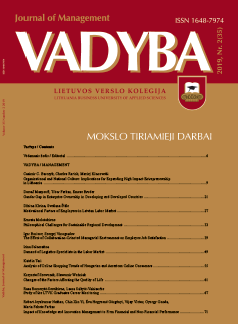DEVELOPMENT AND EVALUATION OF THE STUDENTS’ COLLABORATION SKILLS WORKING IN INTERNATIONAL TEAMS
DEVELOPMENT AND EVALUATION OF THE STUDENTS’ COLLABORATION SKILLS WORKING IN INTERNATIONAL TEAMS
Author(s): Vytė KontautienėSubject(s): Higher Education
Published by: Lietuvos verslo kolegija
Keywords: collaboration skills; development; students;
Summary/Abstract: Collaboration is a form of cooperation in pursuit of a common goal, social interplay of human beings, emerged in joint attempts of work related activities. The foundation of collaboration is composed of the structural interaction. The essence of such – situations of equal communication, where “a human being is free to make own decisions and feel responsible for own made actions; it is an opportunity to be heard, understood and accepted the way you are“. The skills of collaboration are acquired only during a group work. The field of sports is rich in a potential of group collaboration elements. Based on Bennett et al. (2000) cooperative learning model, it is presumed that in a process of development of collaboration skills a tight interaction, positive interdependence should be achieved, skills of joint work developed, direct communication, ability to reflect as well as personal responsibility should he promoted. The aim of the research is to analyze and assess the cooperation skills of students, participating in an international Erasmus IP project by applying the tourism and sports animation program.The following research methods were applied: analysis of scientific literature, semi-structured interview, development project (Erasmus Intensive Program’s (IP) Project “Sport for tourist animation”, and qualitative data analysis.Research organization. The research was conducted using case study methodology in January 2015. The semi-structured interview was carried out using the social media (Cooper et al, 2016) and had 6 students (3 females and 3 males). Research results revealed that during the Erasmus IP (intensive program) project “Sport for tourist animation“ a favourable environment for cooperative learning was ensured: a positive psychological climate was established which allowed the project participants to develop skills of self-expression (self-confidence, self-esteem, creativity). Students were able to feel psychologically safe, shared their experience, were which attentive and friendly, supported, and encouraged each other. They were united by a sense of unity and a common goal. Team based and individual collaboration skills of students were developed throughout all of the tourism and sport related activities: beach volleyball and tennis, canoe and kayak, windsurfing, teambuilding, evening animation tasks, and national evening events. Based on the collaboration model, the following skills of students, participating in the Erasmus IP project, were developed: ability to express and accept a verbal and physical emotional support; cooperative learning, listening to others and expression of own ideas; play assigned role; pursue a common goal; be a leader, supervise, organize; actively participate, when activities are organized by others; rate the activities in consideration of their efficiency and values. Results gathered from the interview responses highlighted a specific factor in regards to development of the collaboration skill – a sense of national pride and responsibility for own country and university had influence on students’ sense of responsibility.
Journal: VADYBA
- Issue Year: 35/2019
- Issue No: 2
- Page Range: 97-104
- Page Count: 8
- Language: English

